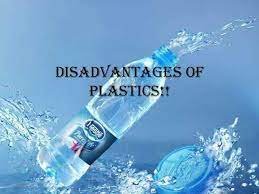Plastic waste is highly visible as it makes up the majority of total solid waste.It is because of its high visibility that plastic waste has been seen as a major solid waste problem. In this article, we will study the disadvantages of plastics.
Introduction:
Plastic is a synthetic or semi-synthetic material used in a huge and growing range of applications. It has become part of our lives. Plastic consumption is steadily increasing every year. Low density, strength, user-friendly design, manufacturability, long life, light weight and low cost are the factors contributing to this remarkable growth.
What are Plastics?
Plastics are defined as materials containing organic matter of high molecular weight as an important component. It is also characterized as a polymer with long carbon chains. All plastics are called polymers.
The word “plastic” comes from the Greek word “plasticos” which means “to mold”. Fossil fuels contain compounds containing hydrogen and carbon (hydrocarbons) that act as building blocks for long polymer molecules. These building blocks are called monomers and bond together to form long chains of carbon called polymers.
Properties of Plastics:
- It is light in weight.
- High chemical resistance.
- High dielectric strength.
- Easily cut to desired shape and size.
- Available in clear or colored.
- With plastics you can do things like drilling, sawing and punching.
- Cheaper than metal.
- Powerful and flexible.
- Poor electrical conductor.
- Plastic resists corrosion.
Disadvantages of Plastics:
Major disadvantages of Plastics include:
- Generally, plastics are made from non-renewable resources:
The raw material for plastic is derived from plant fibers, but most products made today are based on fossil fuels. This is usually petroleum, but natural gas can also be used to produce this product. About 4% of this fuel continues to produce new products directly from the plastics sector. Given the amount of resources used in the recycling process and the projected increase in demand, the cost of plastics compared to fossil fuels could approach 20% within the next decade. This is the main disadvantage of plastic.
- World water pollution is mainly due to plastics:
Plastic constitutes up to 80% of all marine debris. This problem is caused by marine and terrestrial sources that often accumulate in wide-open areas where the tides converge. The problem involves finding trash on land, on beaches, and even in freshwater sources. Agitators, bottles, cables, food wrappers, and plastic straws are some of the more common items. It costs US$5 per kg to decontaminate ocean surfaces with plastic, while reusing this product costs US$0.30. This is why ocean cleanup efforts are led by non-profit organizations. This is another disadvantage of plastic.
- Plastic contamination can result in numerous economic costs:
Pollution of plastic packaging itself costs the global economy more than $80 billion annually. It accounts for about 50% of the total waste in this industry, and almost all other industries process waste in some form.Construction and plastics account for 16% of plastic use, while textiles account for about 15%. Since many commodities are not recycled, most are likely to be diverted to waste streams. The average plastic recycling rate worldwide is about 14%. India is one of the world’s leading countries in recycling around 60% of plastics and plastic products, while the United States ranks last in the industrialized world with a recycling rate of only 9%. This is also a disadvantage of plastic.
- Plastic items cannot be recycled indefinitely:
Metal can be recycled many times into different items due to the nature of the material. This is not an opportunity offered by plastics. It can only be extracted or reused by people a few times before losing its integrity and quality. This means that this product is more likely to be discarded or burned in landfills. Some plastic products cannot be recycled, which can exacerbate the effects of these defects. Each year, over 93 billion plastic items end up unaffected and end up in our waste stream. This is the downside of plastic. Recycling the product requires energy to be used to clean the plastic. Unusable items are formed in plastic, leading to cross-contamination with other types. Also, the material needs to be cleaned before the recycler turns everything into new parts. This is also a disadvantage of plastic.
Recycling of Plastics:
Plastic recycling is very important. If not recycled in time, it is mixed with other chemicals or products, making recycling difficult and causing pollution. They are not biodegradable and do not break down under microbial attack. To prevent this, it is important to use biopolymers or biodegradable polymers.
Frequently Asked Questions – FAQs:
- Why is plastic terrible?
Plastic ingestion is life threatening to animals and humans eventually digest this plastic. A recent Belgian study found that Britons who eat fish risk eating 11,000 pieces of plastic per year. And in less than a year, half of all plastic produced goes to waste.
- Why do animals die when they eat plastics?
Animals that accidentally swallow plastic suffer and sometimes die as a result. The stomach is full of swallowed plastic, which naturally reduces hunger. Animals drink less, gain less energy and become weaker.
- Why is plastic harmful to humans?
The human body absorbs chemicals applied to plastics. These substances have been found to alter hormones or have other possible effects on human health. Plastic waste, contaminated with chemicals and sometimes eaten by marine animals, can harm or kill wildlife.
- What is the major impact of plastics?
Plastic pollution causes harmful pollutants that harm people, animals and plants. Plastic takes hundreds or even thousands of years to decompose and can cause long-term damage to the environment. It infects every organism in the food chain, from small species like plankton to whales.
